Cleaning your German Shepherd’s ears is a normal part of grooming and something that should be done routinely. Failing to do so properly could result in serious health problems. Here’s how to clean your dog’s ears and why it’s important.
Other articles you would like: Are German Shepherds Easy To Train? and Are German Shepherds Allowed In Japan?.
Pick A Calm Area
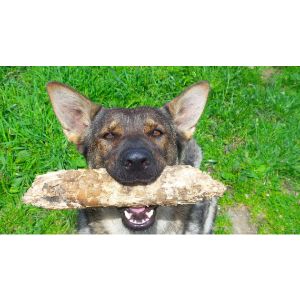
You should clean your German Shepherd’s ears outside since this can be a messy process. When the ear cleaner is inserted, most pups shake their heads. Cleaners can be thrown several feet when this happens.
It may be a good idea to lay out a few towels around your German Shepherd before getting started if you’re going to do this indoors.
Apply The Ear Cleaner
Place a hand on top of your dog’s head and hold his head straight. Do not hold his neck. Someone else may be able to help you with this.
You can gently lift your dog’s ear up by pulling it upward. You can then pour in the cleanser more easily after exposing the ear canal. Your dog’s ear canals should be tipped with the recommended amount of cleaner according to the manufacturer’s instructions.
Clean Out The Ears
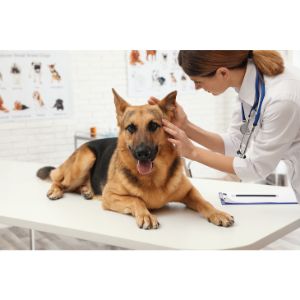
Your dog’s ears should be massaged at the base. Cleaners can then take effect after sinking into the skin. Dirt can also be easily wiped away by doing this.
Be careful not to get sprayed with the cleaner if you don’t step back after this! The dirt in your dog’s ear can be removed gently with a cotton swab or one side of a towel.
Don’t get too deep into the subject. A clean cotton swab or clean side of the towel should be used when the dirty swab or towel is dirty. Swabs or towels should be cleaned until they are clean.
Repeat The Process With The Other Ear
You can start working on the other ear as soon as you’re done with one. It may be possible to do this with your German Shepherd without any problems if he is relatively calm.
They may be fussy if their ears are sensitive. Try again a little later on the other ear if your dog moves around too much. Keeping track of which ear you cleaned out is all you have to do.
Trim The Hair
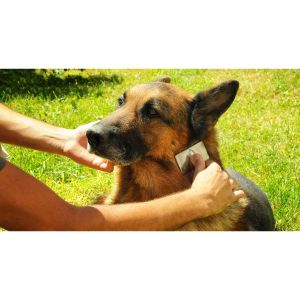
It is always best to finish with this step last. After your dog’s ears have been cleaned, trim their hair. It is important to clean first and then trim whenever necessary. Ensure that none of the ear hair gets into your puppy’s ear canal as you trim his ears.
When cutting the hairs, you may want to bend them forward. If any stray hairs have fallen in the ear canal, use a soft towel to wipe it out.
Keeping your German Shepherd’s ears clean is as simple as reading this article. Their first time around might be a little fussy, but they’ll adjust.
Why Is It Important To Clean A Dog’s Ears
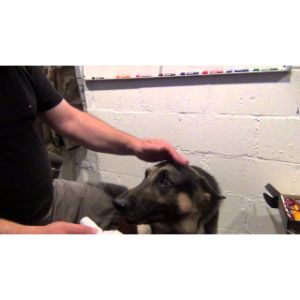
Keeping your dog’s ears clean regularly prevents dog ear infections. Your best bet is to avoid these because they are extremely painful for your pet. Bacteria and yeast thrive in the dirt and excess wax that build up on the surface.
In addition, infection treatments are less likely to penetrate the inner ear when there is too much wax. Keeping your pet’s ears clean should help prevent bacterial ear infections and promote quick recovery in the event that they do develop one.
The ears of your dog should be checked for dirt if he likes to play outside, roll in the grass, run in the woods, or play in the sand. While having fun with your pet, your pet might bite into a twig, a weed, or some other plant.
Make sure you pull these out on a weekly basis. It’s possible for weeds and plants to work their way into the ear canals if they are not cleaned out on a regular basis.
Keep your dog’s ears clean but don’t overdo it. Yeast and other organisms that might compromise your dog’s ears can be controlled by healthy bacteria that live in the ears.
Infections in the ears are prevented by the natural defense of bacteria, which is weakened when too much cleaning is done. Give your pet’s ears a chance to re-establish and multiply before cleaning their ears more than once a week if she is healthy.
Common German Shepherd Ear Problems
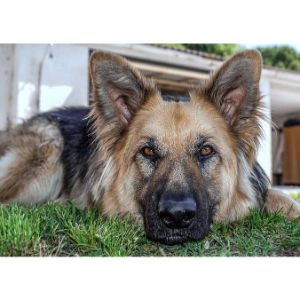
These are some common ear problems that could arise if you fail to clean your dog’s ears properly.
Itchy Ears

The most common cause of itchy ears in German Shepherds is high humidity levels during the summer. Generally, your dog will spend more time in their kennel or pool, if they spend a lot of time outside.
You may notice that your German Shepherd scratches their head or shakes their head frequently if they have itchy ears.
Having your hand behind their ear might also irritate them. A dark waxy brown gunk accumulation in the canal is another sign to look for. If your dog has an ear infection, that could be an indication.
The ears may also show signs of pain when touched, such as closed eyes, tilted heads, and closed eyes.
It’s important to take your German Shepherd to the vet for proper diagnosis and treatment if you suspect they are suffering from German Shepherd Itchy Ears. Infections can vary in severity and require different treatments.
Ear Hematomas
German Shepherds who scratch their ears excessively usually develop hematomas caused by an underlying issue. Ear infections caused by bacteria or viruses, skin allergies, or ear mites may be the cause.
Moreover, German Shepherds with floppy ears are prone to German Shepherd ear allergies (causing bruising); this makes them more susceptible to ear infections.
A German Shepherd ear infection will cause him to scratch his ears and shake his head incessantly; these are common symptoms of German Shepherd ear infections.
Yeast Infection

Yeast infections in German Shepherd ears will require antifungal medication or ointment from your veterinarian. It may be necessary to prescribe tablets and vaccinations.
It may be necessary to perform a deep cleaning of your German Shepherd’s ears and consider German Shepherd ear surgery if your GSD’s middle or inner ears have been compromised.
Clean your German Shepherd’s dirty ears afterward and keep them dry to prevent this from happening.
Parasites
You’ll likely be prescribed medication, special cleansers, or shampoos by your veterinarian, and even shown how to clean your German Shepherd’s ears at home as part of the treatment plan for German Shepherd ear infections.
Your GSD’s inner and outer ears may be damaged if you do not follow your vet’s orders. Furthermore, you should inquire about the contagious nature of the ear mites and whether any other pets that you might own should also be checked.
Common Symptoms Of Ear Problems
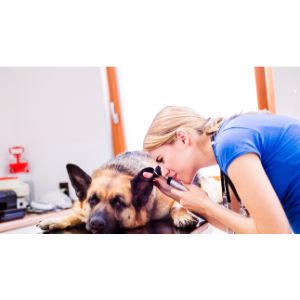
Here are some signs your dog may have an ear problem.
Head Shaking Or Tilting

Ear infections in dogs are most commonly accompanied by shaking or tilting of the head. Dogs who frequently tilt their heads or shake them often have an ear infection and are trying to relieve the pressure in their ear that is resulting from it.
Pawing At The Ear
It is likely that your dog will paw at his or her ear often if it is itching or hurting. They may whine when he does this, but he can also paw at their ears as if it was a perfectly normal behavior with no other symptoms.
Ear Redness and Swelling
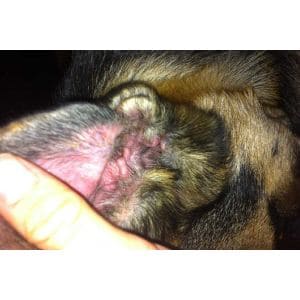
You might notice swelling and redness of the ear as your dog’s ear infection continues to go untreated. As soon as you notice this symptom, go to the vet right away as it indicates the infection is getting worse.
Ear Scabs
A dog with an ear infection may develop scabs inside its ear. It is also possible for your dog to develop these scabs if they have scratched their ears a lot because of the itching caused by the infection.
It may be necessary to treat any secondary infection risks caused by scabs on the ear of a dog with an ear infection with oral medication.
Bad Odor

There should be no bad smell in healthy GSD ears. You may need to clean your German Shepherd’s ears gently using a German Shepherd ear cleaning solution if you notice a pungent smell coming from their ears.
Hydrocortisone, salicylic acid, and/or aloe vera are all common ingredients in these ear cleansers.
In most cases, this is caused by too much dirt or dead skin cells lodged in your GSD’s ears (you should never try to remove earwax or dirt with a sharp or thin instrument).
It is more likely that bad-smelling GSD ears are caused by bacteria or yeast infections.
When your GSD’s ears are infected with yeast, it is usually because the ears receive an excessive amount of moisture from the environment; this, combined with their natural design, facilitates yeast growth.
Discharge
Your GSD may be suffering from either ear mites or serious outer and inner ear infections if he or she has yellow, brown, or even bloody discharge from the ears (which may also have a pungent smell).
German Shepherd ears are most commonly associated with yellow discharge from yeast infections. A waxy or crusty, blackish-brown discharge from the ear is usually caused by ear mites, as discussed previously regarding ear hematomas.
Symptoms such as bloody discharge are more serious. Although yeast infections and bacterial infections are possible secondary causes, parasites and growth masses are more likely culprits.
The warm, moist environment and blood-rich vessels that inhabit your GSD’s ears make them a perfect habitat for parasites like ticks, fleas, and mites.
Inflammation in your GSD’s ears is believed to be the cause of masses (benign and malignant). In the event that your veterinarian determines that bloody ear discharge is due to a torn eardrum, German Shepherd ear surgery will be required immediately.
You will also like:
- Do German Shepherds Get Jealous?
- Are German Shepherds High Maintenance?
- Are German Shepherds Built For The Cold?
For more information about the German Shepherd Breed, check out the video down below:




